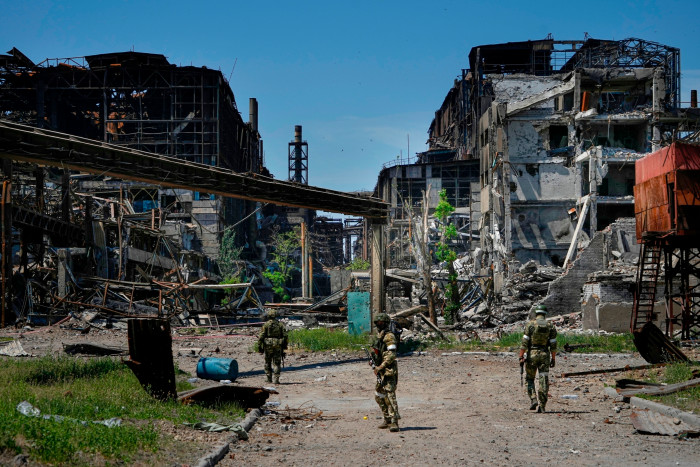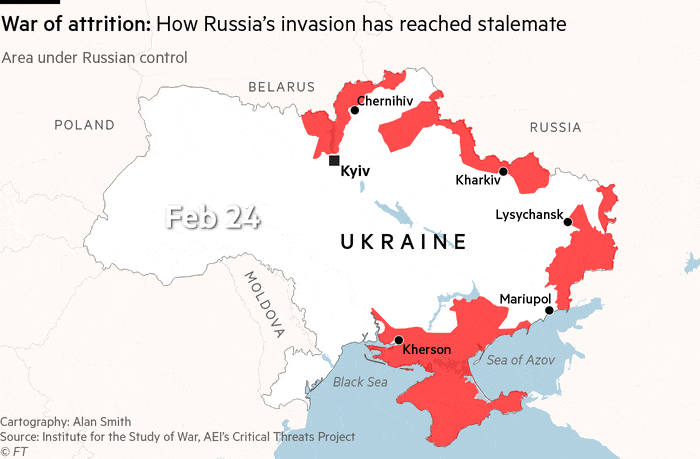
Since the first day of the war in Ukraine, Tyson has watched the Russians from afar, the drones that he operates circling above the enemy deep within his country.
He has learned to recognise the tell-tale signs of grass marked by missile launches or the dark spots suggesting freshly dug graves. On a lucky day, the scurried movements of a Russian soldier lead him to a target for Ukraine’s artillery.
But six months into Russia’s all-out assault on Ukraine, what Tyson sees worries him. Both sides are at a stalemate across much of the 2,400km front line and Russian forces are entrenching themselves for the winter ahead. “All day long, they dig, and they dig, and they dig,” said Tyson, agreeing to be identified only by his call sign.
“The enemy has learned fast,” he said, with a tone of respect. The entrenched Russians are not the easy targets they once were. “What we saw in the beginning, and what we are seeing now — it’s the difference between night and day.”

As Ukraine marks 31 years since independence, and six months to the day since Russian president Vladimir Putin sent tens of thousands of troops into the ex-Soviet state, what Tyson sees in his southern theatre of the war is true across much of the country.
Neither side has the immediate upper hand. Neither side has shown any lasting appetite for negotiations. And neither side is giving up. Ukraine has vowed to fight on until it drives Russia from its territory; meanwhile, the grinding conflict has only appeared to deepen the resolve of Putin to seek victory, despite heavy battlefield losses and western sanctions that have crippled Russia’s economy.
“President Putin says that everything is going according to the plan,” Gennady Gatilov, Russia’s ambassador to the UN in Geneva, told the Financial Times last week. “I very much hope that,” he added.
Both sides are so dug in that “there are no prospects for peace at all — only a ceasefire,” according to a person close to the Kremlin. So far, about 9,000 Ukrainian soldiers had been killed in the war, the army chief said this week. In July, the CIA said at least 15,000 Russian troops had been killed.
Any agreement would be likely to codify the largely static front line separating Ukraine and Russia, with almost a fifth of Ukrainian territory in the invader’s control. Russia still hopes to gain control of the remaining part of the Donbas before the winter, according to the person in Moscow.
“Putin won’t be ready until Russia has all of Donetsk,” the mineral-rich eastern industrial region that makes up half of the Donbas, the person said. “The plan has changed a hundred times. Nobody in Russia has ever fought an army the size of Ukraine’s. This is going to go on for a long time.”
Russian artillery is holding off any Ukrainian attempts to claw back territory. The western weapons supplied to Kyiv are weakening, but not yet defeating, Russia’s war machine.
“The US gives us enough to stop the Russians from advancing, to reverse some gains, to shape the operational direction, but absolutely, clearly, not enough for a major counteroffensive,” said Andriy Zagorodnyuk, a former defence minister of Ukraine.
Ukraine has signalled a counteroffensive to free the southern city of Kherson and push Russian forces east of the Dnipro river but has not yet put in place either the troops or equipment to proceed.
“The tempo of the campaign will slow down over winter, although there will still be ground attacks — Russia attacked Ukraine in the winters of both 2014 and 2022,” said Konrad Muzyka, founder of Rochan Consulting, a military consultancy based in Poland. “But, at the end of the day, both sides probably lack sufficient troops to retake ground and make a decisive difference.”

Putin hopes that the economic blowback from the sanctions will force the west to blink first — leading the US and Europe to end their military support for Ukraine and push Kyiv to sign a deal that codifies Russia’s territorial gains, the person close to the Kremlin said.
“The general idea is for the west to recoil in fear when they see how high energy prices are and have to explain that to their voters,” the person said.
Some in the Russian elite hope Putin moves to end the war, according to a senior Moscow businessman. “They want to end this. They understand now that this is a big [mess],” the person said.
An ultranationalist constituency wants the president to go further still. The murder of commentator Daria Dugina, daughter of ideologue Alexander Dugin, also sharpened hardline sentiment among a Russian elite that now appears to see no shame in things the Kremlin routinely denied for years.
Evgeny Prigozhin, a caterer known as “Putin’s chef” who runs a notorious mercenary group, posed for cameras at Dugina’s funeral — boasting a medal marking him a Hero of Russia, the country’s highest state honour.
Margarita Simonyan, editor of the RT television channel who once drew ridicule for her interview of the men suspected of launching a novichok attack in the British city of Salisbury in 2018, appeared to casually confirm on Twitter that Russia had indeed carried out the nerve agent attack.
In his eulogy for Dugina, flanked by men in armbands at each side of her wreath-decked coffin, Leonid Slutsky, a senator and one of Russia’s top delegates to the failed peace talks, made clear there was no room for dissent. “Whatever your political party, faith, or age, there is only one way. One country! One president! One victory!” Slutsky boomed.

In the face of such rhetoric from Moscow, Ukrainian leaders point to battlefield successes. Defence minister Oleksii Reznikov on Tuesday listed the sinking of the Russia Black Sea Fleet’s flagship Moskva, the retaking of Snake Island and the killing of thousands of Russian soldiers as harbingers of future victory.
And in downtown Kyiv, where the government has dragged the carcasses of Russian tanks to a main thoroughfare, Ukrainians are clear that they are hopeful of a full victory — the restoration of Ukraine’s borders to those established in 1991, with the Donbas and Crimea intact.
Staring inside the blown-off top of a Russian tank, couple Anton and Tetyana pleaded for Ukraine’s western backers to provide their country with more precision weaponry, including anti-tank busters and long-range missiles. The latest US tranche promised another $775mn in equipment, including drones and mine-resistant armoured vehicles.
“The people of Ukraine will not agree to anything short of the return of all territories, including Crimea and Donbas,” Anton said. “Ukrainians are capable of getting the job done on our own. Just give us the weaponry,” Tetyana said.







